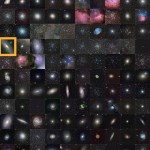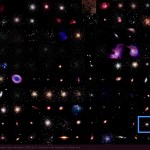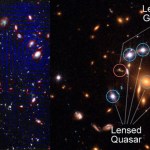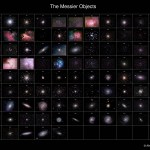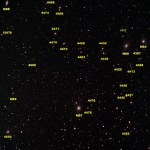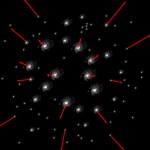redshift
"We find them smaller and fainter, in constantly increasing numbers, and we know that we are reaching into space, farther and farther, until, with the faintest nebulae that can be detected with the greatest telescopes, we arrive at the frontier of the known universe." -Edwin Powell Hubble
With 110 deep-sky objects scattered throughout the heavens, the Messier Catalogue provides skywatchers across the globe with a number of spectacular targets, from nearby nebulae and clusters to spectacular, distant galaxies. Each Monday, we spotlight a new one right here.
Image credit: Rolando Ligustri,…
"Pinwheel, pinwheel spinning around. Look at my Pinwheel and see what I found.
Pinwheel, pinwheel, breezy and bright. Spin me good morning, spin me good night." -Janet Gardner
It's time for another Messier Monday, where each week, one of the 110 deep-sky objects that make up the famed Messier Catalogue -- the first large, accurate catalogue of non-cometary objects -- gets an in-depth treatment. These objects are not only a good representation of the brightest deep-sky objects visible from Earth, they're a good sample of the different types of objects visible from any…
“Because dark energy makes up about 70 percent of the content of the universe, it dominates over the matter content. That means dark energy will govern expansion and, ultimately, determine the fate of the universe.” -Eric Linder
It's been a while since we've spoken about dark energy, and we were just talking about Einstein's greatest blunder, so let's just dive right in.
Image credit: S. Beckwith & the HUDF Working Group (STScI), HST, ESA, NASA.
This is our observable Universe, as unveiled by the Hubble Space Telescope. With hundreds of billions of galaxies stretched out some 41…
"Great spirits have always encountered violent opposition from mediocre minds." -Albert Einstein
It may be hard to believe, seeing as how it's been our leading theory of gravity for nearly a century now, but Einstein's General Relativity is possibly the most frequently challenged scientific idea of all-time. Of course, it's emerged victorious from each and every one of those challenges, making a slew of unintuitive predictions that have been spectacularly confirmed each time they've been tested.
Image credit: Miloslav Druckmuller (Brno U. of Tech.), Peter Aniol, and Vojtech Rusin.
This…
"It took less than an hour to make the atoms, a few hundred million years to make the stars and planets, but five billion years to make man!" -George Gamow
Earlier today, a video (from last month) was released where one of the members of the US House of Representative -- a member who sits on the House Committee for Science, Space and Technology -- proudly proclaimed the following:
"All that stuff I was taught about evolution, embryology, the big bang theory; all of that is lies straight from the pit of hell." -Paul Broun
Well, if the Big Bang is a lie from the pit of hell, then the…
"How old would you be if you didn't know how old you are?" -Satchel Paige
Today marks another year and another trip around the Sun for me. For you, and me, and everything on Earth that makes it through another year on this world, there's a whole lot we get to experience.
Image credit: NASA / ISS Expedition 13.
Some things are tiny: the Earth's rotation slows by about two millionths of a second each year, while some are large: we hurtle over 900 million kilometers in outer space as we orbit around the Sun. Our Earth spins just over 366 times on its axis, while our one revolution around…
This is an enhanced version (with some upgraded images and text) of an article I first wrote over two years ago. It is just as valid today as it was back then, only today, I have a special offer to go with it. Next week, a bunch of cosmologists and myself are getting together and all writing about dark energy. And I want you to have your say.
So at the end of this post, ask your dark energy questions. Ask anything and everything you ever wanted to know about dark energy. I'll choose the best one (or, space & time permitting, more than one) and write a special post on it for you then.…
Not long ago, a new preprint on the fine structure constant got a bunch of press, nicely summed up by the Knight Science Journalism Tracker last week. I meant to say something about this last week, but what with it being the first week of classes and all, I didn't find the time.
I still think it's worth writing about, though, so after a reproduction of the key figure, we'll have the usual Q&A-format explanation of why I don't quite trust this result:
So what's this all about? The preprint in question is the latest in a series of attempts to measure possible changes in the fine structure…
Aaah, the Virgo cluster. A huge cluster of hundreds of galaxies, and our closest large neighbor in the Universe. People have known for a long time that although Virgo is still redshifting away from us, it isn't quite as fast as we would expect from the Hubble expansion rate of the Universe. Does this mean that we're gravitationally bound to it, and some day, we'll move into this dee-luxe apartment in the sky?
Nope. Dark energy is here to push it away from us, and we'll unfortunately see this bright neighbor recede farther and farther from us, until it disappears from our sight. So say your…
The Universe isn't a static place. Although the laws of nature (physics, chemistry, biology, etc.) don't appear to change over time, everything in the Universe appears to evolve, and changes over time. One of the simplest ways that this happens is through Hubble expansion.
General relativity tells us how the Universe expands, and more specifically, it tells us that the expansion rate (which we call the Hubble constant, H0) is related to the total energy density of the Universe. More matter density: faster expansion. Greater density of photons (i.e., light): faster expansion. More of any and…
